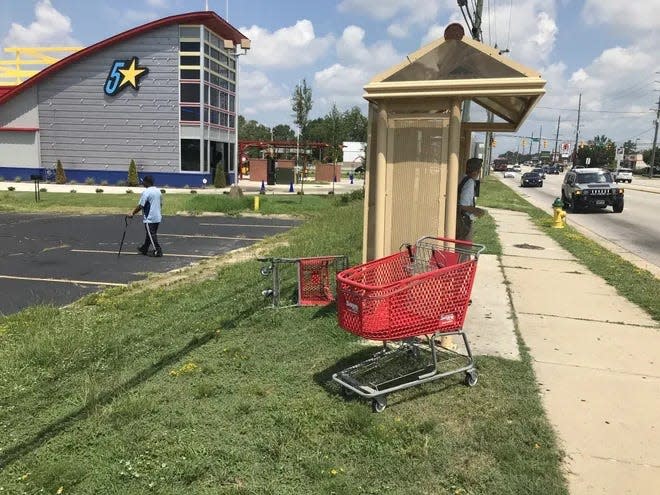Why the Fayetteville City Council is talking about regulating abandoned shopping carts — again

For the second time since summer 2019, the Fayetteville City Council is considering whether to impose regulations on shopping carts in an effort to reduce the number of abandoned carts that litter local streets and highways.
Since May 2020, the city has spent $78,000 to have employees collect discarded shopping carts, a city official said.
The City Council discussed options to address the cart issue Jan. 3, and directed the city staff to develop an ordinance to address stray carts.
Here’s a look at the situation.
‘It’s just an eyesore’ —In 2019, Mayor Mitch Colvin was frustrated with all the shopping carts dumped around town.
NC has a law about shopping carts, but cities do not
North Carolina law says it is a misdemeanor for someone to take a shopping cart away from business premises. The penalty is a fine, said Brook Redding, special projects manager for the city manager’s office. No North Carolina cities or counties have an ordinance that regulates the businesses for stray carts, he said.
Despite the law, city staff found 1,000 abandoned carts between May 2020 and October 2022, Redding said. It cost $78,000 in staff time to find the carts, process them, talk to retailers, and collect or dispose of them, he said.
Redding said a city shopping cart ordinance could require retailers to have a system to contain and collect the carts, and it could impose fines and penalties for abandoned carts.
Some stores already try to keep their carts from getting away, Redding said.
For example, ALDI requires customers to pay a quarter for a cart, and the quarter is returned when the cart is returned, he said. And Food Lion has a magnetic barrier that locks the cart wheels when they leave the property.
2019 City Council debate:Should the city penalize the businesses that own the shopping carts? Or prosecute shoppers who take them?
The City Council’s thoughts
A cart ordinance might have implications for business development, Redding said. The mayor disagreed.
“This is a good market for a store,” Mayor Mitch Colvin said. “They're going to come in and not go the other way because we've got a shopping cart ordinance.”
Councilwoman Courtney Banks-McLaughlin said retailers should be held accountable and hire someone to take care of the issue. “We have other things, other priorities we need to focus on,” she said.
Councilman D.J. Haire said he’d prefer the city consider turning the unclaimed carts in for scrap metal instead of paying fees to dispose of them at the landfill.
Councilman Derrick Thompson made a motion to direct staff to develop an ordinance to address the stray carts. Councilman Deno Hondros was the only council member who opposed it.
Hondros said he’d prefer that the city make an agreement with the North Carolina Retail Merchants to get the stores to address the matter.
After the cart issue came up in August 2019 and the city considered an ordinance, Fayetteville established a memorandum of understanding agreement with the North Carolina Retail Merchant Association. The association worked with big box retailers to establish “best practices” regarding the carts, Redding said. The agreement ran from May 2020 to April 2021.
Staff writer Rachael Riley can be reached at rriley@fayobserver.com or 910-486-3528.
This article originally appeared on The Fayetteville Observer: Fayetteville could be first NC city to have shopping cart rule

